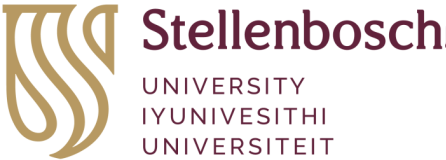
Applications for the 2026 BEng (Chemical Engineering) intake closed on 31 July 2025.
- About the BEng programme
- Why choose us?
- Curriculum overview
- First-year curriculum
- ECSA accreditation
- Graduate attributes
- Application and admission
- Selection and admission criteria
- Foreign schools / International curricula
- International students
- Extended Curriculum Programme
- Fees and personalised quote
- Bursaries
- Student accommodation
- Contact us
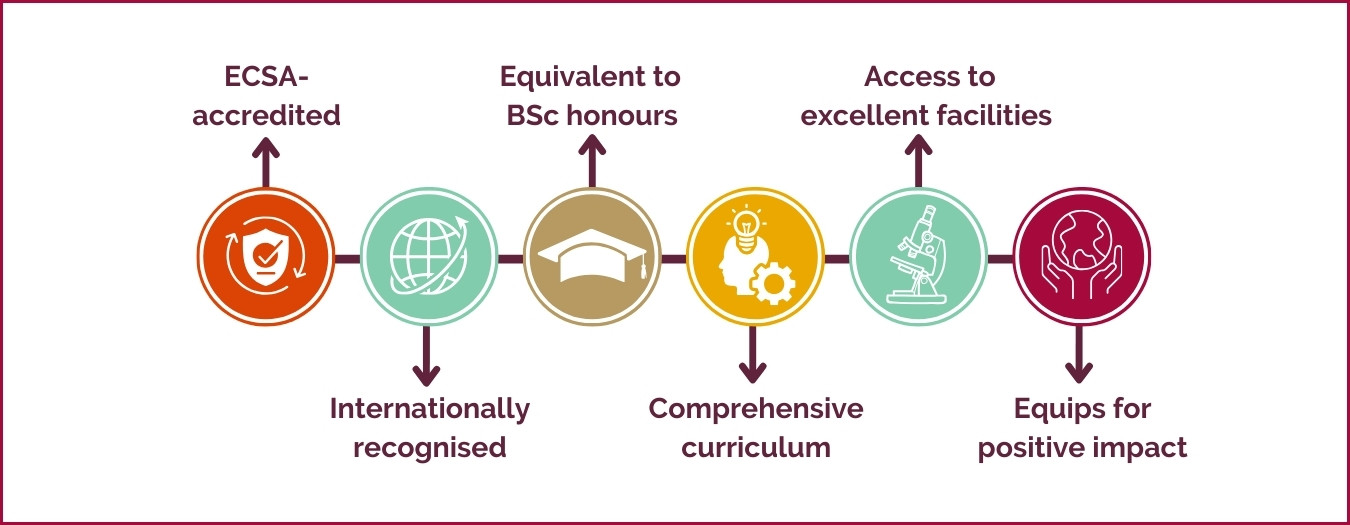
ECSA-accredited professional degree
The BEng Chemical Engineering programme at Stellenbosch University (SU) is accredited by the Engineering Council of South Africa (ECSA). It is a rigorous degree recognised for its professional standards, spanning a minimum of four years and specifically designed to equip you with essential skills and knowledge. Upon graduation and acquiring practical experience, this degree enables you to pursue registration as a Professional Engineer (PrEng), which is not the case with all qualifications in this field in South Africa. Achieving PrEng status not only signifies your engineering competence but also opens doors to various engineering roles where your expertise is respected and valued.
Internationally recognised qualification
ECSA, as a signatory of the Washington Accord, ensures that degrees accredited by ECSA for training professional engineers hold international recognition among other signatories. This recognition extends to BEng Chemical Engineering graduates from Stellenbosch University, enabling them to pursue registration as professional engineers (or equivalent) in countries including the United Kingdom, Ireland, Canada, the USA, Australia, and Hong Kong.
Equivalent to an honour’s degree
The BEng Chemical Engineering degree at SU is recognised under NQF level 8 of the South African National Qualifications Framework, placing it on par with an honours-level BSc qualification.
Comprehensive curriculum coverage
Over the course of four years, you will engage with a comprehensive curriculum that covers essential aspects of chemical engineering, laying a solid foundation in the field. The BEng Chemical Engineering programme ensures a thorough understanding of fundamental sciences, such as mathematics, physics, and chemistry, alongside specialised areas including thermodynamics, reaction kinetics, mass transfer, reactor design, separation processes, control systems, and plant design. This degree will equip you with the skills and knowledge to make a positive impact in South Africa and globally. An overview of the curriculum is available here.
Access to excellent facilities
When studying chemical engineering at SU, you gain access to excellent facilities for teaching, practical training, and research. The department offers pilot-plant facilities and specialised laboratories in bioprocess engineering, extractive metallurgy, separation technology, and water treatment, as well as a computer centre for process simulation and data processing. These resources are designed to equip graduates with the skills and experience needed to succeed in both industry and further academic pursuits.
Stellenbosch University (SU) offers a premier Chemical Engineering programme in a globally recognised institution. Nestled in the scenic Cape Winelands, our campus is one of the world’s most beautiful. With distinguished faculty, cutting-edge facilities, and comprehensive programmes, SU provides a top-tier education for aspiring chemical engineers.
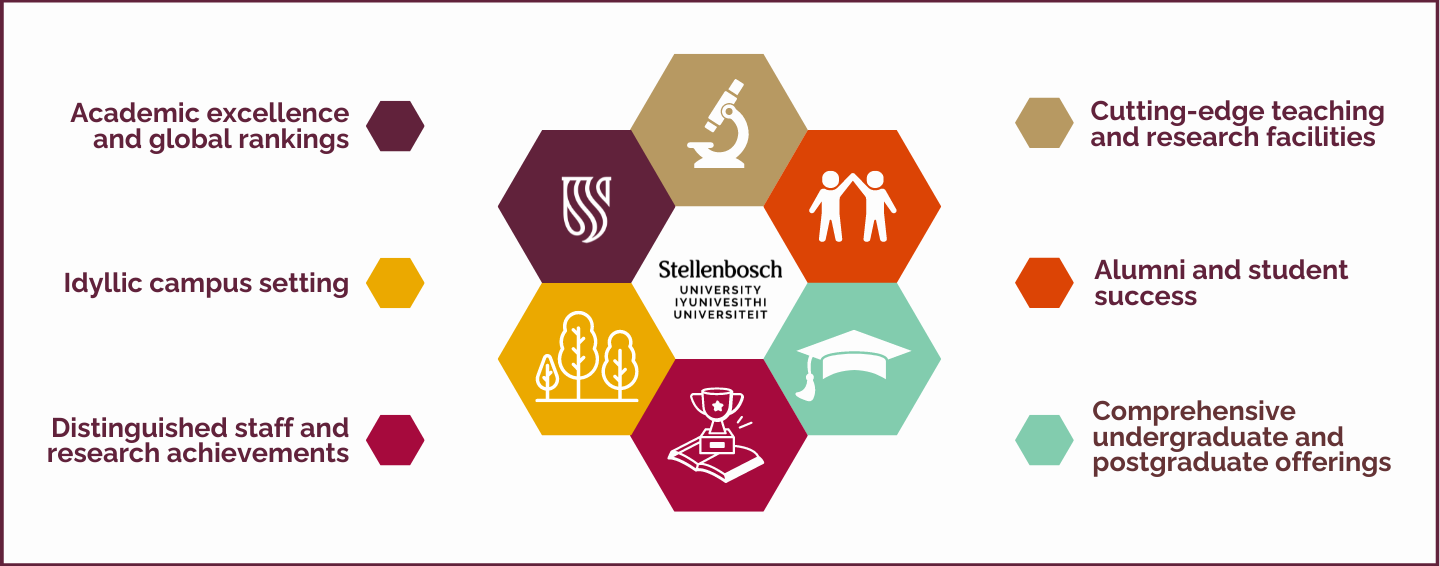
Why choose Stellenbosch University?
Academic excellence and global rankings
SU is consistently ranked among the world’s top tertiary institutions. The latest Times Higher Education (THE) World University Rankings (WUR) by Subject places SU in the top 500 for Computer Science, Physical Sciences, and Engineering, and among the top 300 globally in six of the 11 subject categories. The 2024 Quacquarelli Symonds (QS) World University Rankings by Subject (released on 10 April 2024) also places SU in the top 500 for Engineering and Technology.
Idyllic campus setting
Stellenbosch is nestled in the heart of the Cape Winelands, where the historic town and stunning natural surroundings create an exceptional living environment. Beyond its academic excellence and world-class research outputs, SU’s campus has been ranked among the top 25 most beautiful campuses in the world. This prestigious list, published by Veranda magazine, includes renowned institutions such as the University of Bologna in Italy, Royal Roads University in Colwood, Canada, and Oxford University in England.
Distinguished staff and research achievements
The Department of Chemical Engineering boasts world-class lecturers and researchers. The faculty includes two distinguished professors, and researchers ranked in the top 2% of their disciplines globally. Staff members serve on editorial boards of leading international journals, and 17 of the 22 academic staff hold PhD degrees. Nine staff members have NRF ratings and ten are registered as ECSA PrEng. The Department has consistently received multiple faculty and institutional awards and coordinates significant international research collaborations.
Comprehensive programme offerings
In addition to the BEng Chemical Engineering programme at the undergraduate level, the Department offers a wide range of opportunities at the postgraduate level. This includes Master’s research degrees and PhDs in five specialised areas: Bioresource Engineering, Extractive Metallurgy, Separations Technology, Machine Learning, and Water Technology. Recently introduced are two new structured Master’s degrees in Sustainable Chemical Engineering and Data Analytics, meeting the rising demand for advanced skills in these fields.
Alumni and student success
Since the Department’s inception in 1969, our commitment to excellence in teaching and research is reflected in our impressive alumni numbers: over 500 Master’s graduates, more than 130 PhD graduates, and 7 DEng graduates. Currently, we have approximately 100 Master’s students and 45 PhD students actively pursuing their degrees, alongside an undergraduate BEng Chemical Engineering programme with around 400 students enrolled. The record-high intake of first-year students in 2024 underscores our continued success in educating future leaders in the field.
Cutting-edge facilities
Our department features state-of-the-art research facilities, including a unique pilot plant, one of the largest on the continent, where students gain hands-on experience. We have a workshop for manufacturing our own equipment, along with an extensive bioengineering facility equipped with cutting-edge tools for innovative research. For undergraduates, we offer a laboratory outfitted with a diverse range of equipment to teach practical aspects, complemented by our well-equipped analytical facility that allows us to conduct in-house analyses. The current ongoing Engineering faculty-wide refurbishment aims to position our facilities as the most modern in SA.
See what chemical engineers do.
Kristin shares her experience in the mineral processing industry.
Annerie shares her experience in the mineral processing industry.
Why choose Chemical Engineering?
Chemical engineering (or alternatively process engineering) is a compelling field due to its pivotal role in society and diverse career opportunities across various sectors. Chemical engineers are essential in ensuring the safe and environmentally friendly processing of raw materials into valuable products that are integral to modern life. They specialise in optimising processes to enhance efficiency, reduce costs, and minimise environmental impact, making their work crucial in industries, such as:
- Biotechnology: Innovating in areas like vaccine development and pharmaceuticals.
- Petrochemicals: Converting raw materials into essential chemicals and fuels.
- Cosmetics, mining, and metallurgy: Enhancing product formulations and refining techniques.
- Water purification and technology: Developing sustainable solutions for clean water.
- Renewable energy: Advancing technologies for sustainable power generation.
- Nanotechnology: Pushing boundaries in material science and electronics.
- Explosives, paper, pulp, and food and beverages: Optimising production processes for safety and efficiency.
Chemical engineers (or process engineers) are involved in diverse roles, such as process design, optimisation, production coordination, and research and development. Their expertise extends to management consultancy and data science, reflecting their adaptability and analytical skills in various industries. Moreover, pursuing postgraduate studies at SU can lead to specialisation in areas like bioresource engineering, water technology, or machine learning, opening doors to academia or advanced research careers.
In essence, choosing chemical engineering offers the opportunity to make significant contributions to society by improving everyday products and services, while also playing a crucial role in sustainable development and technological innovation.
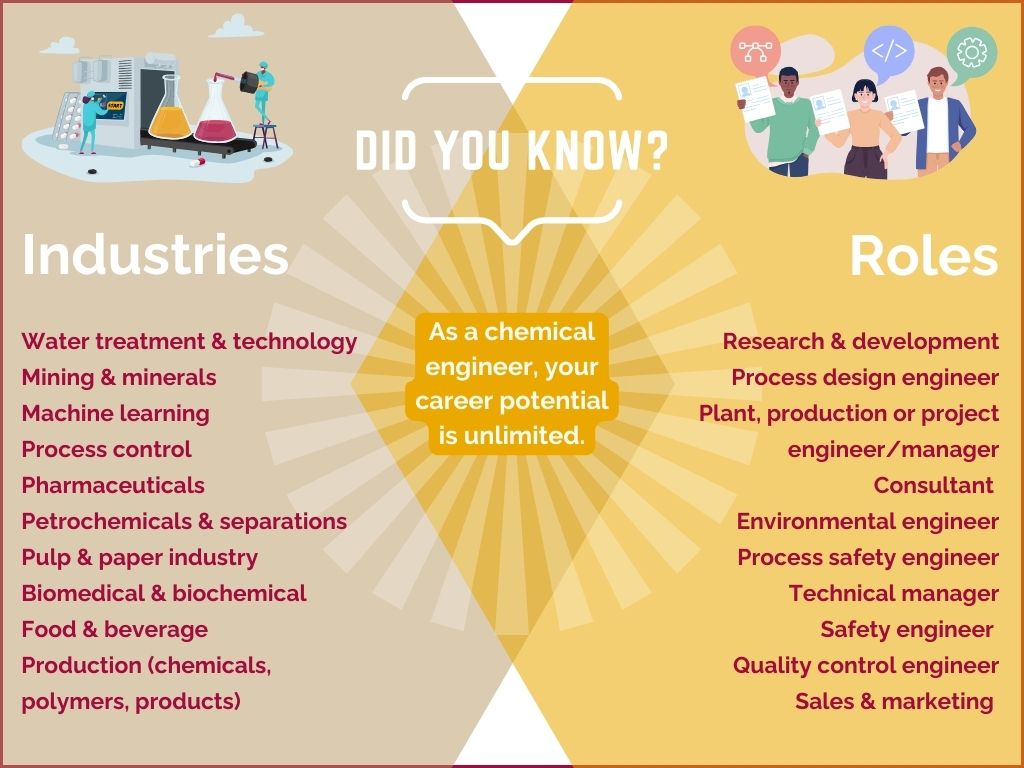
Chemical Engineers: The Universal Engineers
Chemical engineers are often referred to as “universal engineers” due to their broad and versatile skillset, allowing them to work across diverse industries and tackle a wide range of challenges. This term underscores their diverse capabilities and significant impact in shaping industries and addressing global challenges through their technical expertise and adept problem-solving abilities.
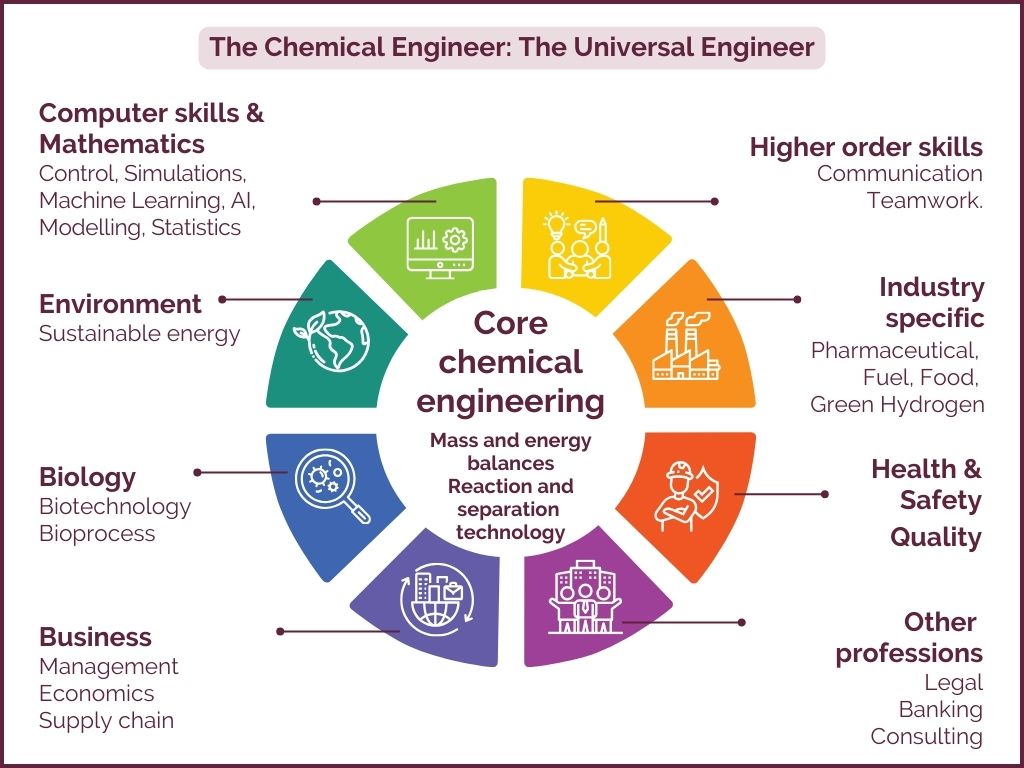
For the complete curriculum of the four-year BEng (Chemical Engineering) programme, refer to the Engineering Yearbook Part II (Section 2.11.3 – 2.11.4).
First year
Our Bachelor of Engineering (BEng Chemical Engineering) begins with a common first year, where all BEng students enrol in the same foundational modules. These modules focus on mathematics and fundamental natural sciences, such as physics and chemistry, applied to the engineering context. Additionally, you will gain insights into ethics, professionalism, and effective intercultural communication.
Second and third years
Second- and third-year modules will provide you with a solid theoretical foundation in key chemical engineering concepts. You will learn to effectively describe and model the behaviour of different phases of matter. You will gain an understanding of fundamental concepts that explain heat transfer, chemical reactions, entropy, and you will apply mathematics to calculate their rates and extents.
You will learn to design reactors, heat exchangers, and transport equipment such as pipes, valves, and pumps, as well as necessary separation process units to obtain a pure product. Additionally, you will develop coding and analytical skills applicable in engineering and other fields. These skills will enable you to design and optimise new processes and to ensure smooth, safe, and sustainable operation of these processes.
Your training also includes laboratory-based practical experiments and vacation work, during which you will apply and test the theories you have learned through industry-based processes.
Fourth year
In the fourth and final year, you will undergo intensive preparation for entry into the industry. You will receive training in managing large engineering projects as part of interdisciplinary engineering teams. Your undergraduate studies will culminate in designing a chemical, biochemical, or metallurgical plant, applying all the theory learned up to that point. You will also undertake a final-year research project, where you will independently investigate an engineering problem and devise a suitable solution using principles of chemical engineering.
The following video depicts the progression of the BEng Chemical Engineering programme from the first to the final year. Prof. Tobi Louw provides a comprehensive overview of our curriculum structure and content. Remember, at SU all BEng programmes start with a common first year, marked by a maroon block around certain modules in the video. This means all first-year engineering students register for these core modules, regardless of their programme.
Curriculum of the first year of BEng Chemical EngineeringThe curriculum of the first year of the BEng (4yr) is the same for all fields of study. For the complete curriculum of the four-year BEng (Chemical Engineering) programme, refer to the Engineering Yearbook Part II (Section 2.11.3 – 2.11.4). |
|
| Semester 1 | |
| Module | Credits |
| Applied Mathematics B 124 | 15 |
| Engineering Chemistry 123 | 15 |
| Engineering Mathematics 115 | 15 |
| Engineering Physics 113 | 8 |
| Intercultural Communication 113 | 8 |
| Engineering Drawings 123 | 15 |
| Semester 2 | |
| Applied Mathematics B 154 | 15 |
| Computer Programming 143 | 12 |
| Electrotechnique 143 | 15 |
| Engineering Mathematics 145 | 15 |
| Strength of Materials 143 | 12 |
| Chemistry C 152 | 6 |
| Optional supplementary modules offered at the discretion of the home department of the module. You may not register for both modules at the same time. | |
| Engineering Chemistry 143* | 15 |
| Engineering Drawings 143** | 15 |
| *This module repeats the content of Engineering Chemistry 123 and is offered in hybrid format during the academic recess. If you failed Engineering Chemistry 123, you may complete this module instead of repeating Engineering Chemistry 123. **This module repeats the content of Engineering Drawings 123 and is offered in hybrid format during the academic recess. If you failed Engineering Drawings 123, you may complete this module instead of repeating Engineering Drawings 123. |
|
ECSA accreditation
All of Stellenbosch University Faculty of Engineering’s four-year and extended BEng programmes, including Chemical Engineering, are accredited by the Engineering Council of South Africa (ECSA) for registration as professional engineers. This accreditation ensures that each programme meets the required number of credits per ECSA knowledge area and assesses all ECSA exit level outcomes. Completing a BEng programme guarantees that you will meet ECSA requirements for engineers, regardless of your elective choices.
For more information on ECSA’s functions related to engineering education and accreditation, visit ECSA’s website.
Graduate attributes
Graduate attributes (GAs) encompass the essential qualities, competencies, and knowledge that an engineering student must acquire by graduation. These attributes form the cornerstone for becoming a professional engineer, equipping you with the necessary skills to navigate and contribute to the engineering field in South Africa and globally.
The GAs developed during your Chemical Engineering studies include:
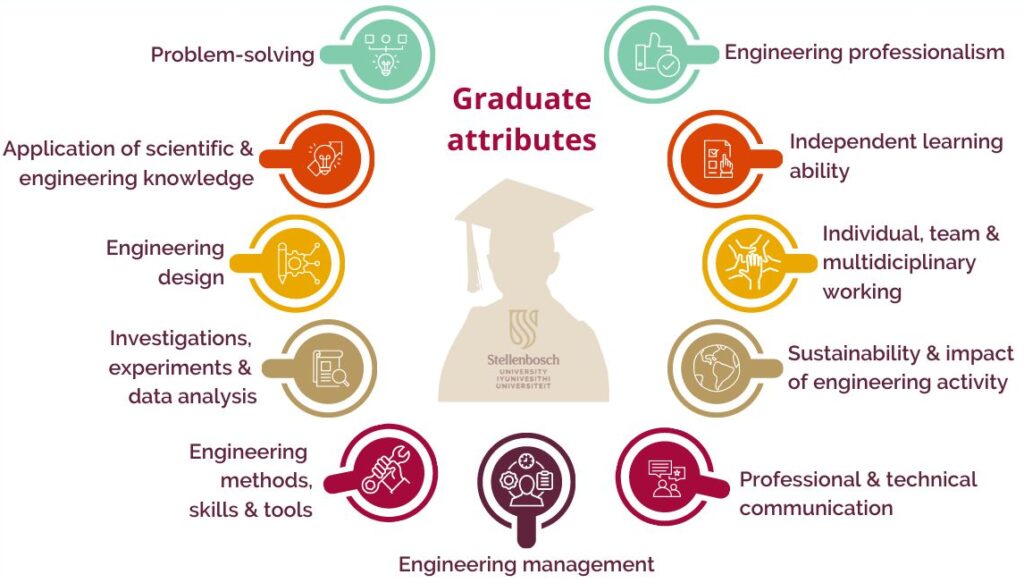
Application due dates
Applications close on 31 July for the upcoming academic year. Late applications close on 30 September and are considered based on availability in the Chemical Engineering programme. Take note of the important closing dates here.
Path to admission
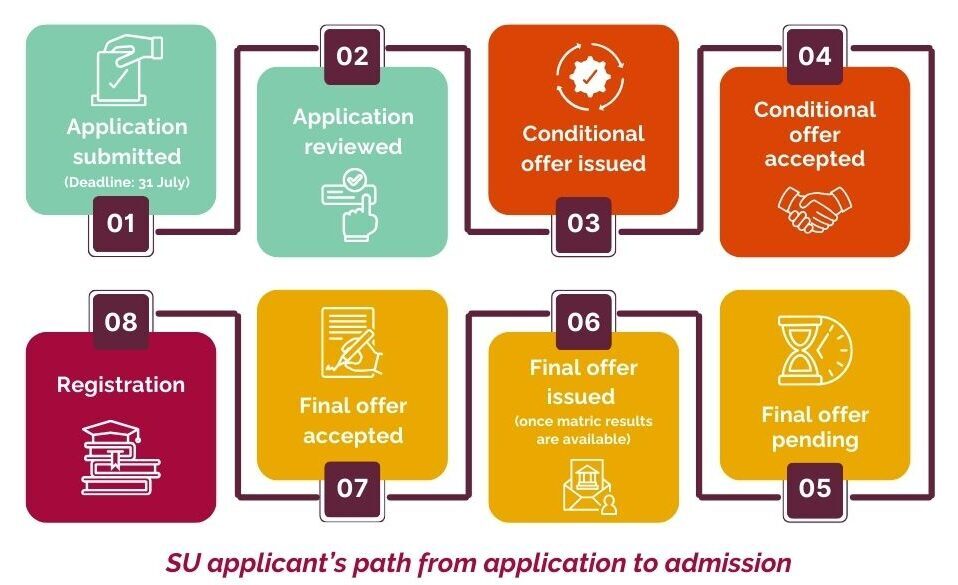
Application
To be considered for admission to the BEng Chemical Engineering programme, applicants must apply online via the SUN Student Applicant Portal before the application due date. If applicants are in Grade 12 at the time of application, their final Grade 11 results are used to determine eligibility for conditional admission. Grade 12 term (or preliminary) marks are not considered for conditional/provisional admission.
If prospective students, at the time of application, have already completed Grade 12, their final Grade 12 results are used to determine their admission. If selected, they receive a final offer which must be accepted before expiration.
For details on how to apply online at Stellenbosch University (SU), click here. Ensure your application is complete by uploading all required documents; you can find the list of required undergraduate documents here. Please note that an application fee is payable; more information is available here.
Conditional offer
Conditional admission means that you have been identified as a suitable candidate for the programme. Applicants must accept the conditional offer before the expiration deadline. Once accepted, the applicant status will change to “final offer pending,” with final offers issued after Grade 12 results become available in January. Grade 12 term (or preliminary) marks are not considered for admission.
Final offer
Applicants will receive a final offer if their final school-leaving results meet the minimum admission requirements for the BEng Chemical Engineering programme.
National Senior Certificate (NSC) and Independent Examinations Board (IEB) final school-leaving results are automatically retrieved from the Department of Basic Education, provided the applicant is a South African citizen and their ID number appears on their matric certificate.
If you completed the NSC or IEB but are not a South African citizen and/or your ID number does not appear on your matric certificate, you must email your final results to info@sun.ac.za. Be sure to include your APP or ID number and send the results as soon as they become available.
Applicants from international schools, such as Cambridge, must upload their final results from 1 November via Undergraduate International Applications, regardless of whether they are South African citizens. The University does not receive these results automatically.
Once a final offer is issued, the applicant’s status will change from “final offer pending” to “final offer issued.” If you receive a final offer, you must accept it before the expiry date.
Applicants on the waiting list, those who request reconsideration, or those who submit late applications will be considered for any remaining places in the programme.
Tracking your offer status
Keep a close eye on the notification bell in the top-right corner of your online applicant profile for important updates regarding your application, selection, and admission. Regularly checking these notifications (and your email) will help you stay informed.
Need help?
Contact undergradchem@sun.ac.za if you have any enquiries about the undergraduate selection and admission process. If you encounter any issues with uploading your application documents, please email the SU Client Services Centre at info@sun.ac.za. Include your full name and application number in all correspondence with SU.
The detailed admission requirements for the BEngChemical Engineering degree programme at Stellenbosch University (SU) are outlined here (English) and here (Afrikaans).
Selection thresholds
Applicants that meet the following provisional selection thresholds are selected upon receipt of a complete application (conditional, if based on Grade 11 results):
- Minimum overall average of 70% (excluding LO)
- Minimum mathematics mark of 75%
- Minimum physical science mark of 65%
- Provisional minimum selection score: 640 (to be reviewed at the end of July depending on the number of applications received)
* Also take note of the minimum achievements in language subjects required for the National Senior Certificate (NSC) examination, or equivalent.
Note:
Engineering Graphic Design (EGD), CAT, IT, and AdMaths are not required for admission to any BEng programmes at SU.
Additionally, the National Benchmark Test (NBT) is not needed to apply for any of SU’s engineering programmes.
While there is no specific focus on or requirement for extra-curricular activities in your BEng application, engaging in these pursuits can greatly enrich your campus experience and enhance opportunities such as residence admission (e.g., Maties Sport).
Selection score
The main selection mechanism is the selection score. To calculate the selection score, the percentages achieved in the respective subjects are used, as follows:
Selection score = Mathematics + Physical Science + 6 x Average
The selection score is calculated using the percentages obtained in Mathematics and Physical Sciences, plus the average percentage of the six best matric subjects (excluding Life Orientation and Mathematical Literacy). This broadens the range of subjects considered, with Mathematics and Physical Sciences effectively contributing twice. The maximum score is 800.
For foreign schools with only 5 subjects (e.g. Cambridge), the percentage of the 5 school subjects are used to calculate the average percentage. For foreign schools where Chemistry and Physics are taken as separate subjects, the average of these two is used in the selection score instead of Physical Science. For the Cambridge system, Mathematics, Chemistry and Physics must be on A or AS levels.
Note:
Applicants who do not currently meet the minimum requirements will either be waitlisted or deemed unsuccessful. If you are close to meeting the minimum criteria, you can apply with your current results, be placed on the waiting list, and work towards improving your final marks for consideration of acceptance.
Admission thresholds for the BEng Chemical Engineering programme are influenced by applicant numbers and available student places. Final selection thresholds for the BEng programmes are determined after the application deadline and can vary annually.
Transfer applicants from other institutions
Applicants applying to transfer from another university or tertiary institution to study BEng Chemical Engineering at SU must submit their final school-leaving results and full academic record. They will be placed on a waiting list until September/October and offers will be issued based on their academic performance in matric and at their current institution. Applicants will remain on the waiting list until their current year’s academic record from the other institution is available and uploaded to their application profile. Please also go to section 2.4.2 Applicants with prior tertiary learning of the Engineering Yearbook Part II for more information on admission requirements.
Changing of preferred BEng programme
Applicants for a BEng programme can request to change one of their three preferences by emailing info@sun.ac.za, including their student numbers and the desired new preference. These requests will undergo the standard admission and selection process for the newly indicated BEng programme.
Note that all four-year BEng programmes, except for Data Engineering in BEng (Electrical & Electronic Engineering), share core modules in the first year. Successful completion of these modules allows students to switch to any other BEng programme with the same core at the end of their first year. If first-year modules are not passed, changing to another BEng programme is subject to a selection process.
Need help?
Contact undergradchem@sun.ac.za if you have any enquiries about the undergraduate selection and admission process. If you encounter any issues with uploading your application documents, please email the SU Client Services Centre at info@sun.ac.za. Include your full name and application number in all correspondence with SU.
Foreign schools / International curricula
South African applicants from foreign schools should refer to the international curricula information available here or download the International Undergraduate Prospectus here. Please take note of the minimum admission requirements for admission in the Faculty of Engineering.
Applicants from international schools, such as Cambridge, who have received conditional admission and have a “final offer pending” status must upload their final school-leaving results via Undergraduate International Applications from 1 November, regardless of whether they are South African citizens. Please note that the University does not receive these results automatically.
International applications and admission
We do consider international applicants for admission to the BEng Chemical Engineering programme. Every year, the Faculty of Engineering attracts a growing number of students from various countries, including the United Kingdom, Belgium, India, Qatar, China, and several other African nations.
For more information about international undergraduate applications, click here.
Download the international undergraduate applications/admission requirements booklet here. Please take note of the minimum admission requirements for admission in the Faculty of Engineering.
Applicants from international schools, such as Cambridge, who have received conditional admission and have a “final offer pending” status must upload their final school-leaving results via Undergraduate International Applications from 1 November, regardless of whether they are South African citizens. Please note that the University does not receive these results automatically.
International student support
The SU International Office can provide support to international applicants with regards to:
- Application and enrolment processes
- Immigration and medical health cover requirements
- Accommodation information and guidance
- Assistance with matriculation exemption applications
- Welcoming and orientation programmes
For enquiries regarding the undergraduate evaluation of international curricula: suiundergrads@sun.ac.za.
For finance-related enquiries: suifinance@sun.ac.za
For accommodation enquiries: interhouse@sun.ac.za
For immigration and medical health cover enquiries: immigration@sun.ac.za
This applies to international candidates (including Permanent Residents, Refugees, Asylum seekers) at international schools, including applicants registered for Cambridge, Pearson, International Baccalaureate (IB Diploma), American High School Diploma, IEB-ISC, etc. [excluding National Senior Certificate (NSC) and Independent Examinations Board (IEB)].
International student fees
An application fee is payable when applying to study at Stellenbosch University. Read more here.
Please note that international students pay international student fees, which may vary based on the candidate’s primary citizenship. Click here for more information regarding international student fees.
To request a provisional statement of fees for any year of the BEng Chemical Engineering programme at SU, click here. Under ‘module selection’ select the modules you plan to enrol in for the upcoming academic year. For assistance with the list of first-year engineering modules, click here. For modules in subsequent years, refer to the Engineering Yearbook Part II. After completing and downloading the quote, save the file and open the PDF from your file explorer to view the document, as it may not open directly in the browser.
If you need assistance generating a quote, please email undergradchem@sun.ac.za.
Extended Curriculum Programme
The Extended Curriculum Programmes (ECPs) assist students from educationally disadvantaged backgrounds in mastering the BEng programmes. ECPs require an additional year of study preceding the 4-year BEng curriculum.
Students cannot apply directly to the ECP; they must apply for the 4-year programme. A limited number of students who are not selected for the 4-year programme but meet the ECP’s admission and selection requirements will be considered for admission to the ECP. Preference is given to students from disadvantaged environments. Click here for details on the selection criteria for the ECP.
Application fees
When applying to study at Stellenbosch University, an application fee is payable. Read more here.
Tuition fees
For more information about study fees at SU, click here.
Provisional and personalised quote
To request a provisional statement of fees for any year of the BEng Chemical Engineering programme at SU, click here. Under ‘module selection’ select the modules you plan to enrol in for the upcoming academic year. For assistance with the list of first-year engineering modules, click here. For modules in subsequent years, refer to the Engineering Yearbook Part II. After completing and downloading the quote, save the file and open the PDF from your file explorer to view the document, as it may not open directly in the browser.
If you need assistance generating a quote, please email undergradchem@sun.ac.za.
The First Year Chemical Engineering Merit Award (FYCEMA)
FYCEMA is an internal merit bursary scheme within the Department of Chemical Engineering for new first-year students enrolled in BEng Chemical Engineering. The scheme offers bursaries to top achieving first-year students who have obtained a final grade 12 average of 88% and higher. No application is required; qualified students receive provisional bursary offers directly from the department after conditional admission has been granted. Final bursary offers are issued upon receipt of final acceptance to the programme (i.e. after final grade 12 results have been made available). The FYCEMA bursaries are subject to terms and conditions. For more information about the FYCEMA bursary scheme, please email undergradchem@sun.ac.za.
Undergraduate Excellence Awards for first-year students
There are four categories of Undergraduate Excellence Awards for first-year students at SU, based solely on academic achievement. As these awards are not based on financial need, no application is required. Recipients are automatically identified using final Grade 12 results. Read more about the Undergraduate Excellence Awards for first-year students here.
Senior Merit Bursary (for senior-year students)
The Senior Merit Bursary is awarded to senior undergraduate students from their second to final year based on academic achievement. No application is required; recipients are automatically identified using the previous year’s final results. Read more about the Senior Merit Bursary for senior-year students here.
Institutional bursaries and funding
For more information on institutional bursary funding options, visit the Centre for Undergraduate Bursaries and Loans (CUBL) website by clicking here.
Industry bursaries
Visit the Bursaries South Africa website for links to industry bursaries available for undergraduate students intending to enrol in Chemical Engineering. Note that mining-related bursaries can also be applied for if you are planning to study Chemical Engineering. Other industry bursaries that the Department of Chemical Engineering is aware of will be listed below as and when available.
Student accommodation
For information about student accommodation options in Stellenbosch, including university residences and private accredited accommodation, click here.
Prospective first-year students seeking information about SU residence application and placement procedures can find everything they need to know here.
International students can read more about accommodation options here.
Other useful student accommodation links are listed here.
Contact us
For any undergraduate enquiries or if you are a prospective student needing support, please email us at undergradchem@sun.ac.za.
If you encounter any issues with uploading your application documents, send an email to the Stellenbosch University Client Services Centre at info@sun.ac.za. Include your full name and application number in all correspondence with SU.








